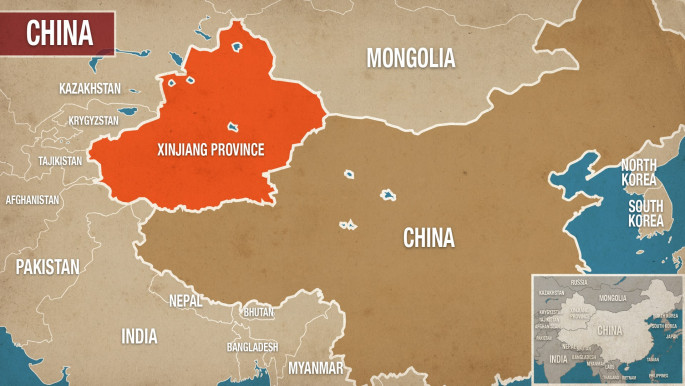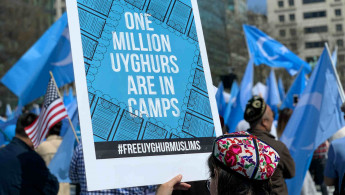UN ambassadors slam China's treatment of Uighur Muslims in Xinjiang
UN ambassadors from 22 states - including Australia, Britain, Canada, France, Germany and Japan - co-signed the text sent to the Human Rights Council president, Coly Seck, and the High Commissioner for Human Rights, Michelle Bachelet.
China is reportedly holding one million people, mostly ethnic Uighurs, in internment camps in Xinjiang.
Rights groups and former inmates describe them as "concentration camps" where mainly Muslim Uighurs and other minorities are being forcefully assimilated into China's majority ethnic Han society.
Read more: China pressures Uighurs to marry non-Muslims
The letter expresses concern "about credible reports of arbitrary detention... as well as widespread surveillance and restrictions, particularly targeting Uighurs and other minorites in Xinjiang."
|
It calls on China to stop arbitrary detention and allow "freedom of movement of Uighurs and other Muslim and minority communities in Xinjiang."
The authors, who include ambassadors from across the EU as well as Switzerland, requested that the letter become an official document of the Human Rights Council, which ends its 41st session in Geneva on Friday.
Diplomats rarely send open letters to the 47-member council to criticise a country's record, but the move may have been the only available option to spotlight Xinjiang, with China likely having enough support to vote down a formal resolution.
Chinese officials describe the camps as voluntary "vocational education centres" where Turkic-speaking Uighurs receive job training.
Beijing has said the centres are necessary to steer people away from religious extremism, terrorism and separatism.
Following a flare-up in violence in 2014, Chinese authorities rolled out various draconian security measures in Xinjiang - from banning long beards and headscarves to placing up to a million residents in detention camps.
Those free from detention are said to live in what is essentially a testing ground for the world's most sophisticated high-tech surveillance methods.
Muslims in Xinjiang are forced not to fast during the Muslim holy month of Ramadan and have allegedly been forced to drink alcohol and eat pork - both forbidden in Islam - in internment camps.
Rights groups and former inmates see the measures as part of a campaign to forcefully assimilate Uighurs and other minorities into the country's majority ethnic Han society, diluting their unique cultures and religious beliefs.
 |
Follow us on Twitter: @The_NewArab





 Follow the Middle East's top stories in English at The New Arab on Google News
Follow the Middle East's top stories in English at The New Arab on Google News
![The UAE is widely suspected of arming the RSF militia [Getty]](/sites/default/files/styles/image_330x185/public/2024-11/GettyImages-472529908.jpg?h=69f2b9d0&itok=Yauw3YTG)
![Netanyahu furiously denounced the ICC [Getty]](/sites/default/files/styles/image_330x185/public/2024-11/GettyImages-2169352575.jpg?h=199d8c1f&itok=-vRiruf5)
![Both Hamas and the Palestinian Authority welcomed the ICC arrest warrants [Getty]](/sites/default/files/styles/image_330x185/public/2024-11/GettyImages-2178351173.jpg?h=199d8c1f&itok=TV858iVg)